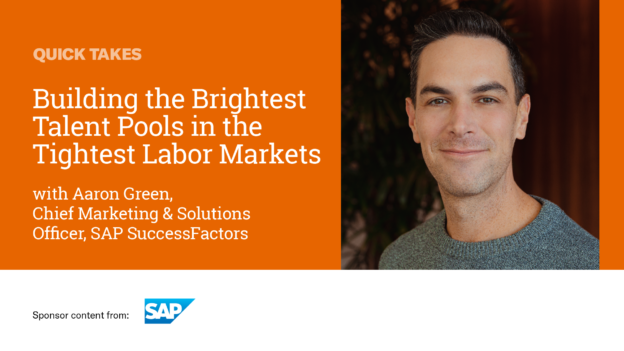Tweet
Post
Share
Annotate
Save
Julie Devoll
Welcome to today’s HBR Quick Take. I’m Julie Devoll, editor for special projects and webinars at HBR. Today we’re speaking with Aaron Green, who is the chief marketing and solutions officer at SAP SuccessFactors.
Aaron Green
Hey, Julie. Thanks for having me here.
Julie Devoll
Hi, Aaron. Thank you so much for joining us today. Let’s get started.
Organizations today are facing many challenges, whether it’s shifting market dynamics or labor shortages. How can they set themselves up to succeed in today’s environment, with an eye toward the future? What are some of the roadblocks? And how do they move forward?
Aaron Green
Yeah, absolutely. Julie, I think probably the number one thing or challenge that’s facing organizations today is really around the skills gap itself. And it’s something that all our customers are really concerned about. In fact, skills are the new and future currency of work.
And what this fundamentally means is we need to rethink the way in which we both retain and attract talent and look for the right skills at the right times in the organization. In a recent survey, more than 75% of business leaders said that hiring and retaining talent is the number one most critical factor for achieving growth. And we know that our people are the most valuable asset that any organization has. And our people are what allow us to innovate, compete, and grow.
So what this means for an organization is that we have to be able to understand the skills that we have today, but also understand the skills that are needed in the future. And build plans to upskill, cross-skill, reskill, and, in some cases, bring in those skills from the outside market. This is really the way that any company, but especially a growth or scale-up company, needs to be thinking about how they look at talent.
Julie Devoll
So I want to switch a little bit to tools and processes. When an organization commits to using different tools to share insights and intelligence across all its practices, how do employees experience that change?
Aaron Green
Yeah. So we know that in order to deliver an extraordinary customer experience or a customer outcome, you really have to have an extraordinary employee experience—an employer and employee value proposition—because when you do this, and when you really focus on your people, your people end up having more meaningful work experiences. And these translate into higher productivity and a better customer experience in whatever industry or geography you’re in.
But this really means that you have to have real-time insights into your total workforce across all worker types, including your contingent labor, because these insights allow you to really unlock the understanding of the skills that your workforce has, their aspirations, their work preferences, and how they’re performing. And it really allows an organization to match that up to the workforce of the future and ensure that your people understand the path to whatever the future growth plans are for the organization.
Julie Devoll
So I want to look ahead to the future. How do you envision artificial intelligence and automation helping organizations boost these insights and efficiencies in ways they can’t really do right now?
Aaron Green
Yeah. So there’s definitely no question that AI is a super-hot topic at the moment. And we’re really privileged at SAP SuccessFactors, with over 9,600 customers and working with over 250 million unique users every day. And our customers are talking to us about AI all the time. And in fact, in a recent research study that we did, we found that recruiting and learning are two of the highest-priority areas for organizations to think about how they invest in AI to really automate many of the manual tasks that are required today.
But there are emerging use cases, things like chatbots for more complex administrative tasks or HR self-service or ticketing, but also AI to drive some of that internal mobility that we’ve talked about, looking at skills profiles and career paths, and using this to actually match people to opportunities inside the organization, whether they’re short-term roles or gigs or longer-term roles. But fundamentally, what this means is that AI-powered talent intelligence platforms are going to become more critical than ever for all organizations, both for HR and for the broader employee base.
Julie Devoll
Well, Aaron, this has been a great conversation. I want to thank you so much for joining us today.
Aaron Green
Thanks for having me.
Learn More.
Aaron Green is SAP SuccessFactors’ chief marketing & solutions officer.

Comments are closed